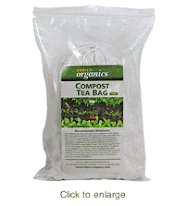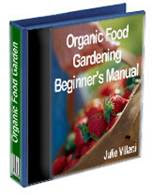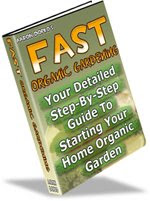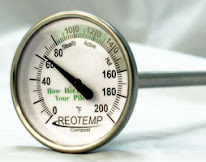How to Make Organic Compost Fertilizer
>> Monday, October 6, 2008
Making compost is a process of cultivating living micro-organisms. These micro-organisms must have 4 ingredients to flourish and produce a nutrient rich fertilizer or mulch. These 4 are oxygen or air, water, nitrogen, and carbon. Nitrogen rich materials are the “green” or moist materials such as fresh grass clipping, leaves, and most other alive landscape substances. Carbon rich materials are the “brown” or dry materials such as dry twigs, leaves, hay, and straw etc. Just keep a note that the greens will be alive and moist and the browns are all things dry. Water will used to wet down each layer of the pile and air or oxygen is added when the pile is turned providing air pockets by not allowing the pile to compress and compact. Many materials are bio-degradable but for organic fertilizer, it must not have any chemicals.
There is not a set method of building an organic compost pile. Piles are built in layers to ensure the proper proportion of nitrogen to carbon, and water and air. Then the layers are thoroughly mixed or “turned”. Begin by selecting the area for your compost pile. If possible, a location with as much sunshine will be best. Next, lay a bed a few inches or so thick of dry straw. Begin mixing in one part greens organic matter with two parts brown organic matter. Spread vegetable, fruit and food scraps near the center. Continue adding your mixture of organic matter as the weeks go by. Fresh materials may be added but should be buried inside the pile to speed composting. It is better to add fresh materials to a new pile. You determine the size you want. (Many of the materials can even be stored in trash bags to be used later or for making winter compost.) You will know your compost pile is working if you feel there is heat. Turn the compost pile from every 3 days to every 6 weeks with a pitchfork or shovel. This turning provides the oxygen necessary for decomposition. Turning the pile will maintain the temperature, allowing all the material to benefit from the heat. If you have odors, organic composting lets you know your pile is too damp or is lacking oxygen, and that more frequent turning is necessary. Frequent turning will result in a faster composting. Add a little water if pile is too dry or does not feel warm to hot, especially in dry weather. You can cover the pile with some black plastic or tarps to reduce watering as the water from the “greens” will be released from heating up.
This is active organic composting and should be ready to use in six weeks to eight weeks. The compost will be ready to use when the pile will no longer generate heat. Compost is ready to use when it has an earthy smell and a dark crumbly appearance. (Passive organic fertilizer is allowing the compost pile to decay on its own without tending, turning, etc, and may take up to 8 months to 2 years. Many factors involved here.) Even in active organic composting, one method may be faster than another. But a variety of techniques will work well too. For more information and free organic composting reports, Click Here!










0 comments:
Post a Comment